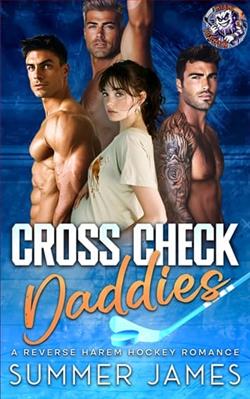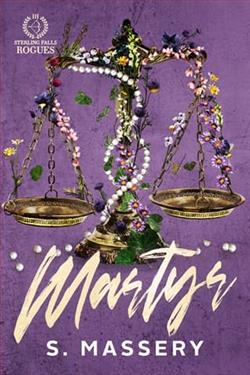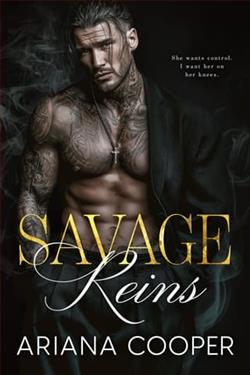Page 78 of Wings Above the Mallee
He couldn’t suppress his chuckle. ‘A food hall?’
‘Uh-huh. If we always fed the animals here at a regular time, wouldn’t they learn to come in from wherever they were on the farm?’
‘The grazers wouldn’t actually need feeding, though.’
‘Needs and wants, Daideó; not necessarily the same thing. If we gave them what was basically a treat food, they’d stay tame.’
‘I don’t think you’d have any problems with them going feral if they’d been hand-raised,’ Heath said. ‘Quite the opposite. I’m worried I’ll come out and find a full-grown bull trying to climb onto your lap for cuddles.’
‘Oh, I wish!’ Charlee exclaimed. ‘Have you seen those cows with the fringe hanging over their eyes and the enormous horns?’
‘Terrifying horns,’ Heath said.
‘Scottish longhorns,’ Sean supplied. ‘I went past a place at Kanmantoo with a few calves in the paddock a couple of weeks ago.’
‘You did?’ Charlee’s head whipped from him to Heath.
‘We’ll see,’ Heath said before she’d even started begging. ‘Though I reckon you can get miniature Highlands, so perhaps give that some thought. And maybe liaise with Roni to see what needs rescuing and rehoming first. It’s not like we don’t have plenty of room. There is a problem, though.’
‘What?’ Charlee said warily.
Sean tensed. They didn’t need problems; no speed humps, no hitches, no roadblocks. He wanted smooth sailing for his son and granddaughter.
‘Do we get two of every animal, so that they always have their own kind as company?’
‘Yes!’ Charlee squealed. Then she clapped a hand across her mouth. ‘Dad, do you think …’ She turned back to look at the barn, where the mica crystals in the stonework glinted as the sun thrust its fingers into the darkness. ‘Do you think we could section off an area in here for any baby animals that we’re bottle-feeding? You know, like Amelia did with Karmaa and Kismet. And then we could have the pairs of babies penned together, so they learn to get along. Like, all in the same area: two calves, two lambs, two goats, two alpaca …’
Sean chuckled. This list could potentially run long enough that the entire barn would be needed.
Heath shrugged. ‘Of course.’
‘And we could have a sign hanging above the stall.’
‘Fur and Feathers Farm, you mean?’ Heath said,
‘No, no, that’s the whole farm,’ Charlee said, unabashedly taking over the entire property. ‘But this is a special part. So we need a sign just for the nursery area.’ She lookeddown at her feet, scuffing her boot through the old hay. ‘For Amelia.’ She shook the over-long fringe she often hid behind from her eyes and met her father’s gaze. ‘Noah’s Ark.’
The vibrating of the phone in his back pocket interrupted what may well have been Sean’s happiest moment of the past two years. He pulled it out, flinching as the caller’s name flashed up. ‘I’ll just get this,’ he said, keeping the screen turned so Heath and Charlee wouldn’t see the display.
By the time he’d moved far enough away that they wouldn’t overhear him—although Heath seemed as invested in the planning of Noah’s Ark as Charlee, manhandling hay bales around to outline where the animal nursery could be set up—the phone had stopped ringing.
He returned the call and Doc Hartmann answered immediately, neither greeting him nor waiting for him to speak.
‘Sean, it’s not end stage.’
‘What?’
‘The results from the latest bloods are in. The markers indicate that you have chronic kidney failure, but it’snotend stage.’
His shoulder hit the stone wall of the implement shed. It seemed the only solid thing in his world. ‘What does that mean?’ He’d been to all the specialist appointments, knew the terminology, yet he hadn’t dared hope. He’d lived with this secret for so many weeks, done all the tests, secretly visited the dialysis unit in Murray Bridge. The specialists had been filled with doom and gloom, told him how dialysis could keep him alive for a couple more years, or a kidney transplant might give him a decade. He wouldn’t take an organ donation anyway: he didn’t deserve it; the damage to his body had been his own doing.
‘This isn’t a free pass, Sean,’ the doc cautioned, although she still managed to sound jubilant. ‘We need a plan to getyour diabetes under control, and you have to keep on top of managing your kidney health. Kidneys aren’t like the liver, they can’t regenerate, so you dodged a bullet this time, but you have to baby them along. No second chances.’
‘I’m not dying?’ This was already a second chance. He slid down the wall of the shed, needing the connection to earth to anchor him. ‘I always thought it’d be my liver that gave up the fight. I deserved it, after all those years of drinking.’
‘No one deserves it, Sean,’ the doctor reproved. ‘And the jury is out on whether alcohol abuse affects kidneys. But in any case, the important takeaway is that your kidney disease is stage four. That’s not good: we can’t fix it. But we can look at managing the progression with the aim of preventing you from reaching ESKD.’
End stage kidney disease. That’s where he’d thought he was. ‘So no dialysis?’ The proposed treatment had been a guillotine hanging over his head because it meant accepting his fate, placing a termination date on his life.















